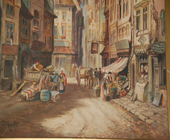 In the book, Return to Order: From a Frenzied Economy to an Organic Christian Society—Where We’ve Been, How We Got Here, and Where We Need to Go, we propose an organic Christian society as a remedy to the present economic crisis.
In the book, Return to Order: From a Frenzied Economy to an Organic Christian Society—Where We’ve Been, How We Got Here, and Where We Need to Go, we propose an organic Christian society as a remedy to the present economic crisis.
The words “organic” and “Christian” have been misused to such an extent that it would be good to clarify what is meant by an organic Christian society. A good beginning is to declare what an organic Christian society is NOT.
Below are ten misconceptions about organic Christian Society.
1. Organic Christian society is NOT the exclusive eating of organic or primitive foods. Rather, it favors the development of distinctive or even refined foods that reflects a culture as might be seen in Italian or French regional cuisine.
2. Such a society does NOT glorify poverty for all. It encourages the natural development of riches in society.
3. Organic Christian society does NOT insist upon the total independence of the family. It is truly a society. Thus, there must be healthy interaction, trade and dependency between members of a community.
4. Organic Christian society does NOT discourage all trade. It encourages trade when needed but not to the point where it dominates local economy.
5. Such a society does NOT understand “local” to be everything within a fifty mile radius. Authentic local products assume a connection between producer, consumer and locality, often over generations.
6. Organic Christian society does NOT exclusively promote smallness. Adjusting to the nature of man and his abilities, it cultivates a culture of small, medium and large-sized properties and enterprises.
7. Organic Christian society is NOT based on the naturalist life of the hippies. While it has spontaneous elements, it is also upright, rational, purposeful, and moral in accordance with natural law and the law of God.
8. Such a society is NOT ecological in the sense of today’s green movement. Organic society does not destroy nature but recognizes man’s dominion over nature and his right to develop it.
9. Organic Christian society is NOT atheistic or pantheistic. It must have the Church as its center and rely upon supernatural aid and the sacraments to assist men to live together in virtue.
10. It is NOT mediocre. A truly organic Christian society strives to Christian  virtue and perfection. It necessarily leads to a high standard of excellence.
virtue and perfection. It necessarily leads to a high standard of excellence.
For more ideas on what defines an organic Christian society, please see the article “Ten Defining Characteristics of an Organic Christian Society”


